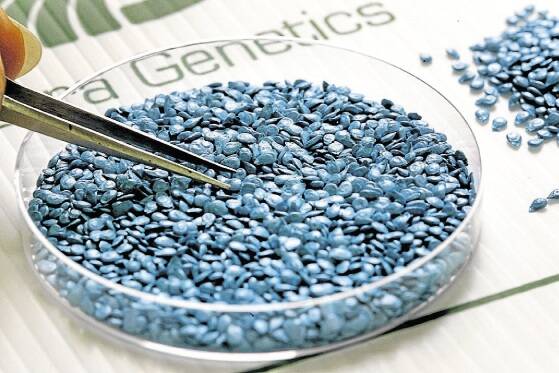

A MORATORIUM blanket ban on genetically modified crops in the state has nothing to do with the science, or the impacts on human health, according to the Tasmanian Institute of Agriculture (TIA).
Subscribe now for unlimited access.
or signup to continue reading
GM food is a polarising topic for many, and earlier this month federal Greens leader Richard Di Natale broke ranks and announced that the party was considering a rethink on its opposition to the science.
The Greens have a long-standing policy position opposing GM crop production that cites precautionary principles amid fears about potential impacts on human health and the environment.
In contrast, the two main federal political parties have GM policies that back the scientific stances adopted by national regulatory agencies, Food Standards Australia New Zealand (FSANZ) and the Office of the Gene Technology Regulator (OGTR).
Despite GM foods being grown throughout the country, except Tasmania, Senator Di Natale said he had no personal objection to the science and that his party was considering a potential policy change on the issue.
In 2014, Tasmania upheld a moratorium on GM-produced crops and extended the life of the blanket ban "indefinitely".
However, TIA director Holger Meinke said it had nothing to do with potential risks to human health or any dubious science.
"In terms of food safety, there aren't any concerns," Dr Meinke said.
"There are no known examples where it has led to serious concerns."
Dr Meinke said instead the moratorium was upheld to give the state an advantage in the economic marketplace.
"The moratorium is in place in order to gain commercial advantage for Tasmanian produce; it is very much a commercial decision and not based on safety concerns," he said.
"It's there to assist the clean and green image that Tasmania upholds."
Dr Meinke said he believed there was confusion among the public about what GM science really was.
"I think there's confusion out there about the outcomes of the GM technology. People think that we are using frog genes in crops or things like that, but that is clearly an application of the technology that would not be possible under conventional practice; it's just not what we do."
Dr Meinke said in terms of quality there was not much difference when it came to traditionally grown versus GM-grown produce.
He said the science of breeding had caught up considerably in the past few years and that similar outcomes could be created using conventional breeding techniques.
"The boundaries are getting increasingly blurred," he said.
"When it [GM technology] was first developed, it was plant breeding in a test tube; they were manipulating genomes to create new varieties.
"Increasingly, these things are possible through traditional breeding techniques; we've reached the stage where you can reach the same outcome with conventional techniques, GM technology is just more efficient."
Due to the moratorium on GM food in the state there are no crops that are bred using this technique in Tasmania.
Dr Meinke said there were exceptions to the rule but that any instances of GM crops in the state were highly regulated and were mainly used in research projects. And he said he wasn't aware of any going ahead in recent times.













